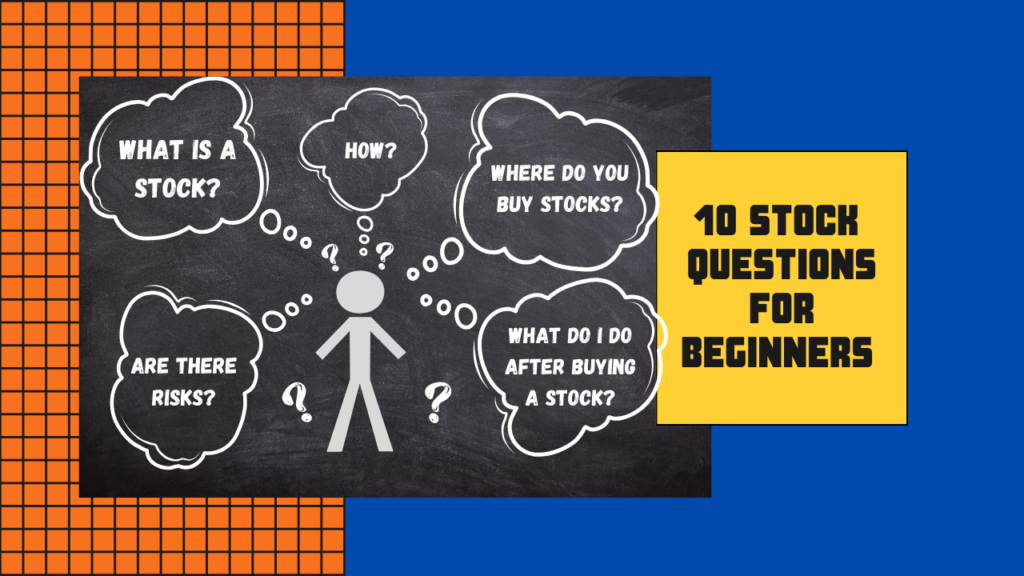What are the basics of a stock? The Stock Market can be very intimidating and scary. What you need, starting at level zero, is a grounding on stocks for beginners.
Investing 101: people make money in the Stock Market. To a new investor, that is what we have learned in the movies, read in books, or heard in normal conversations. But when you think about the “Stock Market”, it is a market where stocks are bought and sold. Like any grocery store, supermarket, business, etc. goods and services are being purchased and sold in these places. Therefore, one can assume that the “goods” being sold in the Stock Market, are stocks. So, what is a stock?

The answers to the 10 questions below will help guide any Level Zero investor to get prepared for when they are ready to purchase their first stock.
1. What is a Stock?
A stock is a piece of ownership of a company. A stock is also referred to as a “share”.
When investors spend their money to buy stocks of a company, really what they are doing is purchasing portions of ownership of that business. As soon as you purchase one stock of a company, you now become an owner of that company.

2. How Many Total Stocks are Available?
The number of stocks will vary from company to company. For example, a large company like Apple has 15.8 billion outstanding shares, but the Tractor Supply Company only has 110 million outstanding shares. Typically, the size of the company will dictate how many shares a company has to offer to investors.
Companies do have the ability to change how many stocks/shares they have available. When they want to increase the number of shares, they “issue new shares” and to decrease the number of shares, they have the option of buying back their shares.
There are many reasons a company might want to change the available number of shares. If they are growing, they might want to make more shares available for investors to buy into. They may also want to reduce the number of shares to create greater value for their shareholders. Think of a pie as the entire company. When the company increases the number of shares, each slice gets smaller, therefore is less valuable. However, a company can decide to reduce the size of each slice by buying back those shares and each slice becomes more valuable.
3. Can I Buy Stocks from Any Company?
No. You can only buy stocks of companies that are public, not private.
Let’s use fast-food chains as an example. Mcdonald’s is a publicly traded company, with the ticker symbol, MCD. As of today, you can purchase one stock of Mcdonald’s for around $260. Looking at another popular fast-food chain, Chick-fil-A, you will NOT find them on the Stock Market, they are a private company.
If you want to learn more about why a company would choose to go public or stay private, you can learn more here at this link.
4. Where do you Buy Stocks?
Stocks are bought and sold in exchanges.
There are many exchanges out there, most major countries will have their own, but one of the most famous is the New York Stock Exchange (NYSE) on Wall Street. While exchanges do have a physical presence, nowadays you can purchase stocks online. Online brokers like Fidelity, Charles Schwab, Robin Hood, etc. are all able to broker these transactions.
5. How do you Buy Stocks?
To purchase a stock, you need to be able to transact with the stock exchanges via a broker.
As previously mentioned, you can purchase stocks in person through an investment firm/company where a human will do the trading for you, but now it is easy to do online.
The steps to buying a stock are outlined below:
- Once you determine which online broker you want to use (most of them are great and there is no wrong answer) you need to open an account.
- Link your online broker account to your bank account to allow easy transfers/deposits.
- Transfer money to your brokerage account.
- This can be automated as regularly timed deposits or one-time manual transfers.
- Find the ticker symbol of the company you want to invest in, and purchase however many shares you want.
To be honest, this process was so much simpler than I thought when I first started. I was worried it would be complicated, and I would need some type of professional to help me. Nope. It was quite simple, and it took minutes to set up and make my first trade.
6. Are there any fees?
It depends. Each brokerage does it differently, however, there are little to no fees for trading stocks anymore.
Several years ago, online and physical brokers would charge a fee per trade. These varied, but some would charge $5 per trade. While $5 doesn’t seem like much, to a beginner who wants to get their feet wet, $5 out of a $100 trade would mean you’d lose 5% return immediately. But recently, brokers started getting rid of fees. This was great because it allowed the “average Joe” to enter the investing world.
7. Are there Risks in Buying Stocks?
Yes. With any investment, there is a risk of losing money. However, there are ways of minimizing risk.
- Buy stocks with a margin of safety.
- Give it time.
- An analysis was done that said if you invest in the Stock Market and hold it for 20 years, you will never lose money. Read this article to see how these probabilities change the longer you hold your investments.
- Invest in what you know.
- This is called a “circle of competence.” The S&P500 is 25% Technology companies. If you are not a technical person or don’t know the difference between a microchip and SaaS (software as a service), then find companies you are familiar with and will be comfortable investing in.
8. Can There Ever be More or Less Stocks?
Yes.
As mentioned above, companies have the ability to increase or decrease the number of stocks available to investors. These are called buybacks and issuing new stocks.
There are other possibilities for companies either leave or enter the Stock Market. When a company decided to go from Private to Public, there is an IPO, Initial Public Offering. On the date they go public, a company will determine how many stocks are available, and for what price. After that, they become a normally traded stock.
A company can also decide to go back to a private company, Twitter is a good recent example, where the company can buy back all remaining stocks at a negotiated share price. If this deal goes through, then that company and its stocks are no longer available in the Stock Market.
9. How is the Price of a Stock Determined?
If we now know that a stock is a piece of ownership of a company, how is the price of that stock determined? When you go to the Stock Market and look at two different companies, AT&T and Telsa, their share price is $19 and $200 respectively. Why are they so different?
The simplest answer to this question is, what is the valuation of the company? Valuations, models, mathematical equations, etc. have been created to try and answer what is a “fair” or “intrinsic” value for a company. A couple of examples include Dividend Discount Model, Discounted Cash Flow Model, Capital Asset Pricing Model, etc. Many of these models will use metrics like Earnings per Share, Free Cash Flow, Expected Return, Return on Invested Capital, etc. to create their models.
With all that being said, there are a lot of factors that go into determining the price. Even the number of shares plays a factor. Think about the examples of a company increasing or decreasing the number of stocks that are available. If a company buys back a bunch of stocks, then the price per stock will increase.
A good investor will look at a company, and do some calculations on their own (or borrow other models) to determine a fair value. From there they can make a decision on if they want to buy or sell.
10. What do I do Once I Buy a Stock?
There are two things we can do with a stock once you buy it: You can sell it or do nothing.
Sell your Stock
Once you buy a stock, you now own a piece of that company. You share in the increase or decrease in the profits of the company. If you purchase a stock for $10, and it increases to $11, you can decide to sell that stock and you will profit $1.
An important note about selling stocks is that the profits will be subject to taxation. I am no tax expert but realized gains (profits made AFTER selling) will need to be put on your annual tax returns.
Do Nothing
The easiest…or hardest…thing about investing is doing nothing.
When it comes to investing, you don’t want to trade/buy-sell constantly. That is not a recipe for success. What good investors will do, is buy stocks of great companies, and hold those stocks forever. As you hold those stocks, reinvest dividends, and purchase more stocks, those gains will compound over time. Warren Buffett had a great quote:
“If you aren’t thinking about owning a stock for ten years, don’t even think about owning it for ten minutes.”
-Warren Buffett
Warren Buffett is trying to tell us that investing is a long-term game. He knows the market is volatile. The price of that stock may go down and it may go up. But as mentioned in the 7th question about risk, you limit your risk by holding onto a stock for 10, 15, or 20+ years. Buy a stock and do nothing.
Summary – You Are Now a Stock Expert!
Stocks are pieces of ownership of a company. When you purchase a stock, you become a part (a very small part) owner of that company.
Understanding that you now “own a business”, you realize that the more successful a company is, the greater rewards for you, the owner/shareholder.
Thanks for reading 10 Questions about Stocks! Hopefully, this gives a good introduction and how we should view them as beginning investors. To continue leveling up from a Level Zero Investor, read this Guide to the Stock Market. And please leave a comment and tell me something you learned.
Disclaimer
Levelzeroinvestor.com is not a registered investment, legal or tax advisor or a broker/dealer. All investments / financial opinions expressed by Levelzeroinvestor.com are from the personal research and experience of the owner of the site and are intended as educational material. Although best efforts are made to ensure that all information is accurate and up to date, occasionally unintended errors and misprints may occur.


